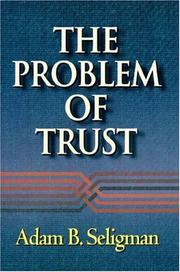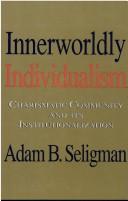| Listing 1 - 10 of 17 | << page >> |
Sort by
|

ISBN: 0691050201 0691012423 1400822378 1400813360 9780691050201 9780691012421 Year: 2000 Publisher: Princeton (N.J.): Princeton university press,
Abstract | Keywords | Export | Availability | Bookmark
 Loading...
Loading...Choose an application
- Reference Manager
- EndNote
- RefWorks (Direct export to RefWorks)
The problem of trust in social relationships was central to the emergence of the modern form of civil society and much discussed by social and political philosophers of the early modern period. Over the past few years, in response to the profound changes associated with postmodernity, trust has returned to the attention of political scientists, sociologists, economists, and public policy analysts. In this sequel to his widely admired book, The Idea of Civil Society, Adam Seligman analyzes trust as a fundamental issue of our present social relationships. Setting his discussion in historical and intellectual context, Seligman asks whether trust--which many contemporary critics, from Robert Putnam through Francis Fukuyama, identify as essential in creating a cohesive society--can continue to serve this vital role.Seligman traverses a wide range of examples, from the minutiae of everyday manners to central problems of political and economic life, showing throughout how civility and trust are being displaced in contemporary life by new "external' system constraints inimical to the development of trust. Disturbingly, Seligman shows that trust is losing its unifying power precisely because the individual, long assumed to be the ultimate repository of rights and values, is being reduced to a sum of group identities and an abstract matrix of rules. The irony for Seligman is that, in becoming postmodern, we seem to be moving backward to a premodern condition in which group sanctions rather than trust are the basis of group life.
Political sociology --- Political systems --- Social psychology --- #SBIB:35H501 --- 316.47.052 --- Bestuur en samenleving: netwerken, inspraak, participatie, interactief beleid --- Vertrouwen in sociale relaties --- 316.47.052 Vertrouwen in sociale relaties --- Social role --- Role, Social --- Social interaction. --- Trust. --- Social role. --- Social interaction --- Trust --- Human interaction --- Interaction, Social --- Symbolic interaction --- Trust (Psychology) --- Social status --- Exchange theory (Sociology) --- Psychology --- Attitude (Psychology) --- Emotions --- Agape. --- Appadurai, Arjun, "ed. --- Arendt, Hannah. --- Axial chasm. --- Banfield, Edward. --- Benhabib, Seyla. --- Bernstein, Basil. --- Boden, Deirdre. --- Bynum, Caroline. --- Calvinism. --- Cambridge Platonists. --- Catholicism. --- Christianity. --- Constant, Benjamin. --- Diderot, Denis, "ed. --- Douglas, Mary. --- Durkheim, Emile. --- Elias, Norbert. --- Frankfurt, Harry. --- Ghana, Frafas people of. --- Grief, Avner. --- Harrison, Bernard, "ed. --- Herman, Gabriel. --- Kahneman, Daniel. --- Lasch, Christopher. --- Macfarlane, Alan. --- Maza, Sarah. --- Merton, Robert. --- Otto, Rudolf. --- Protestantism. --- Puritanism. --- asceticism. --- associational life. --- baptism, private. --- capitalism. --- citizenship. --- civility. --- communitarianism. --- confidence. --- contract law. --- credit, symbolic. --- divorce. --- expectation, trust as. --- externality. --- familiarity. --- friendship. --- game theory. --- honor. --- incivisme. --- marriage. --- networks, of trust. --- postmodernity. --- Rol social. --- Interacción social. --- Interaction sociale --- Role (Sociology) --- Confiance --- Rôle social
Book
ISBN: 0691010811 9780691010816 Year: 1995 Publisher: Princeton (N.J.): Princeton university press
Abstract | Keywords | Export | Availability | Bookmark
 Loading...
Loading...Choose an application
- Reference Manager
- EndNote
- RefWorks (Direct export to RefWorks)

ISBN: 0691116369 0691050619 1400814642 9786612087042 1282087045 1400824699 9781400824694 9781400814640 9781282087040 9780691050614 9780691116365 9780691116365 Year: 2003 Publisher: Princeton (N.J.) Princeton university press
Abstract | Keywords | Export | Availability | Bookmark
 Loading...
Loading...Choose an application
- Reference Manager
- EndNote
- RefWorks (Direct export to RefWorks)
Adam Seligman, one of our most important social thinkers, continues the incisive critique of modernity he began in his previously acclaimed The Idea of Civil Society and The Problem of Trust. In this provocative new work of social philosophy, Seligman evaluates modernity's wager, namely, the gambit to liberate the modern individual from external social and religious norms by supplanting them with the rational self as its own moral authority. Yet far from ensuring the freedom of the individual, Seligman argues, "the fundamentalist doctrine of enlightened reason has called into being its own nemesis" in the forms of ethnic, racial, and identity politics. Seligman counters that the modern human must recover a notion of authority that is essentially transcendent, but which extends tolerance to those of other--or no--faiths. Through its denial of an authority rooted in an experience of transcendence, modernity fails to account for individual and collective moral action. First, deprived of a sacred source of the self, depictions of moral action are reduced to motives of self interest. Second, dismissing the sacred leaves the resurgence of religious movements unexplained. In this rigorous and imaginative study, Seligman seeks to discover a durable source of moral authority in a liberalized world. His study of shame, pride, collective guilt, and collective responsibility demonstrates the mutual relationship between individual responsibility and communal authority. Furthermore, Seligman restores the indispensable role of religious traditions--as well as the features of those traditions that enhance, rather than denigrate, tolerance. Sociologists, political theorists, moral philosophers, and intellectual historians will find Seligman's thesis enlightening, as will anyone concerned with the ethical and religious foundations of a tolerant society.
316.63 --- Authority --- Self --- Transcendence (Philosophy) --- 316.37 --- 316.37 Identiteit. Individu en maatschappij. Persoonlijkheid --- Identiteit. Individu en maatschappij. Persoonlijkheid --- Philosophy --- Personal identity --- Consciousness --- Individuality --- Mind and body --- Personality --- Thought and thinking --- Will --- Political science --- Authoritarianism --- Consensus (Social sciences) --- 316.63 Sociaal bewustzijn. Zelfconcept --- Sociaal bewustzijn. Zelfconcept --- Self. --- Authority. --- Transcendence (Philosophy).

ISBN: 1560001283 9781560001287 Year: 1994 Publisher: New Brunswick: Transaction publishers,
Abstract | Keywords | Export | Availability | Bookmark
 Loading...
Loading...Choose an application
- Reference Manager
- EndNote
- RefWorks (Direct export to RefWorks)
Civil society --- Group identity --- Individualism --- Puritans --- Church and social problems --- Christian sociology --- New England
Book
ISBN: 9780199359479 9780199359486 Year: 2014 Publisher: Oxford Oxford university press
Abstract | Keywords | Export | Availability | Bookmark
 Loading...
Loading...Choose an application
- Reference Manager
- EndNote
- RefWorks (Direct export to RefWorks)

ISBN: 9004089756 Year: 1989 Publisher: Leiden New York Köln Brill
Abstract | Keywords | Export | Availability | Bookmark
 Loading...
Loading...Choose an application
- Reference Manager
- EndNote
- RefWorks (Direct export to RefWorks)
Book
ISBN: 9781400822379 Year: 2021 Publisher: Princeton, NJ
Abstract | Keywords | Export | Availability | Bookmark
 Loading...
Loading...Choose an application
- Reference Manager
- EndNote
- RefWorks (Direct export to RefWorks)
Digital
ISBN: 9781400822379 Year: 2021 Publisher: Princeton, N.J. Princeton University Press
Abstract | Keywords | Export | Availability | Bookmark
 Loading...
Loading...Choose an application
- Reference Manager
- EndNote
- RefWorks (Direct export to RefWorks)

ISBN: 9781400824694 9780691116365 Year: 2009 Publisher: Princeton, N.J. Princeton University Press
Abstract | Keywords | Export | Availability | Bookmark
 Loading...
Loading...Choose an application
- Reference Manager
- EndNote
- RefWorks (Direct export to RefWorks)
Book
ISBN: 0199980217 0199915261 9780199980215 019991527X 9780199915279 9780199915262 9780199915286 0199915288 Year: 2012 Publisher: Oxford Oxford University Press
Abstract | Keywords | Export | Availability | Bookmark
 Loading...
Loading...Choose an application
- Reference Manager
- EndNote
- RefWorks (Direct export to RefWorks)
Experience. --- Pluralism. --- Ritual. --- Uncertainty. --- Philosophy and psychology of culture --- Religious studies
| Listing 1 - 10 of 17 | << page >> |
Sort by
|

 Search
Search Feedback
Feedback About UniCat
About UniCat  Help
Help News
News